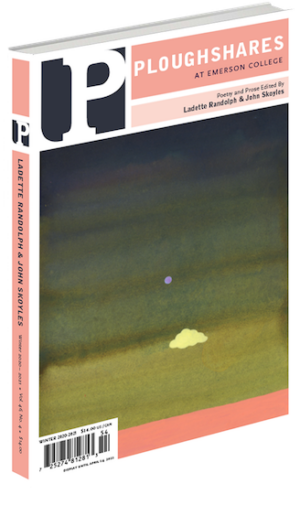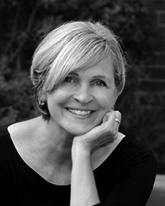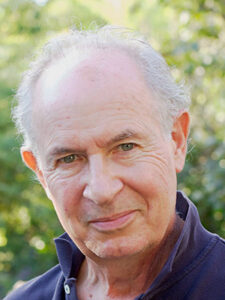Against Temporality (Emerging Writer’s Contest Winner: POETRY)
In poetry, our winner is Mariya Zilberman for her poem “Against Temporality.”
Of her poem, poetry judge Ilya Kaminsky says, “This poem dares to be simple: and, as a result, the nuances are uncovered in the tension between image and time, detail and emotion, silences and linebreaks. We are presented with a number of details, but it is what isn’t presented that moves us, absorbs. ‘A woman asleep on the bus / holds a succulent,’ [Zilberman] writes. But it is the observer that in the end compels us. The eye of the person we do not see who watches & asserts: ‘the slow rise of her chest makes me responsible.’ And, we the readers, also watch, and are, also, responsible. So many tensions can happen if only one slows down, and opens one’s eyes. This poem is an example of how to live.”
When did you first realize you wanted to be a writer?
I don’t know that it happened like that for me. “Want” wasn’t so much in the picture. For as long as I can remember, I’ve been full of questions. I needed some way to work them out. Writing became my way. Reading, also. Even still, I spent a lot of time denying that I was a writer. I don’t deny it anymore, but I’m still intimidated by it. I believe completely in the powers of language—to shape, to connect, to witness, to expand, to condemn, to liberate—and I know so intimately my own flaws and shortcomings. Who am I then to wield language? I can pretty easily spin out into this kind of self-doubt. But I’m compelled to write, so I do, and I try to take seriously the responsibility of writers as truth seekers.
What is your writing process like?
A lot of observation and note-taking. Eavesdropping when it was still OK to be near people. I’m a bit messy, so there’s usually a variety of journals going at once. My background is in journalism and I have a tendency to document, to collect material. But in general, a new poem starts longhand and in prose. I’ll go for pages, mostly just flushing the mind, writing around whatever it is I’m obsessed with or haunted by at the time, and then I’ll pan for anything worth spending more time on—maybe an image or phrase. Also, I have to trust that I’ve discovered something about the poem before I take it to the computer, because I’m quick with the backspace, and I’ll ruin a poem if I start typing too soon. A lot of what I write stays only in the notebook. I have a very “thank u, next” relationship with my work.
What inspired “Against Temporality”?
Circumstance. It was mid-winter in Michigan. I was in my second year of grad school, teaching for the first time, taking more classes than I’d ever taken, and living alone for the first time too. I was exactly where I had fought to be and I felt completely overwhelmed by it. The things I noticed, the places my mind went: they were all a reflection of this inner state. At some point, I started to feel the stress in my body, and I was reminded of the heart murmur I had as a child…so that detail snuck in there.
What kind of research do you do, and how long do you spend researching before writing?
It depends. “Against Forgetting” is not a poem that used or required much research; it came from a specific set of images and observations. (Though I did go down a rabbit hole on “innocent heart murmurs.”) But I love primary sources, and several sequences I’m working on require a lot of reading and archival research. At least one is anchored by a FOIA request.
What is the most difficult part about writing for you?
Starting. Once I’m feeling my way through something and the language is coming together, then there’s all kinds of pleasure happening; it feels good to put what’s in the mind’s eye on paper. But the blank page is a pretty intimidating bouncer, not explicitly because of its blankness, but more so because of how that blankness forces me to face myself, to face what it means to be in the world. And each time, my self says, “I know nothing! I don’t even know what a poem is!” And each time, I have to trick myself into pressing onward. (The trick is lowering the bar.)
Who are you reading? And who informs your work?
The two books I’ve been returning to this year are Whereas by Layli Long Soldier and Catalog of Unabashed Gratitude by Ross Gay. I love their work and these books have been a guide to claiming joy and taking up the call of history. In terms of who else is informing my work: Elizabeth Bishop and Carl Phillips are two poets I read early and both have stayed with me. Adrienne Rich is a guiding light. And my grandparents, whose stories are always in me, and who turned me into a translator from the start.
Do you have any advice for new writers?
The same advice I give myself and struggle to absorb: take the time you need, not the time someone else needs. There are seasons to everything, including writing. Work, also, to build relationships with other writers. Not extractive relationships, not competitive ones—but genuine community and collaborations. I think there’s a lot said about the tenacity it takes to be a writer and not enough credit given to the emotional and material support systems that make tapping into that tenacity possible. So much of what we do is in solitude, but at some point, you need someone you can turn to and say “What have I done?” You need, also, people who will cheer for you open-heartedly, and people for whom you’ll do the same. To that end, I’ll say also: despite all the ways capitalism will tell you otherwise, choose to believe in (and build!) a culture of abundance.
What projects are you working on now? Where is your writing headed?
My first collection! A lot of the poems explore sites around Belarus and wrestle with immigration, assimilation, and superstition. What happens when the sacred and the profane are (as they always are) side by side?
*
A woman asleep on the bus
holds a succulent. The slow rise of her chest
makes me responsible. I polish my dusty tongue,
chisel initials into the woodblock.
Shrill song of the windows. Trees shedding layers
as I shroud in them. Outside, a bloody
buck drags itself into the brush. Bag of fertilizer
spilt on the dining table.
Innocent murmur of the anxious heart: I wake
in a cold room, dress with the lights off.


